- Home
- Matt Forbeck
Mutant Chronicles
Mutant Chronicles Read online
Contents
Title Page
Dedication
Acknowledgments
Chapter 1
Chapter 2
Chapter 3
Chapter 4
Chapter 5
Chapter 6
Chapter 7
Chapter 8
Chapter 9
Chapter 10
Chapter 11
Chapter 12
Chapter 13
Chapter 14
Chapter 15
Chapter 16
Chapter 17
Chapter 18
Chapter 19
Chapter 20
Chapter 21
Chapter 22
Chapter 23
Chapter 24
Chapter 25
Chapter 26
Chapter 27
Chapter 28
Chapter 29
Chapter 30
Chapter 31
Chapter 32
Chapter 33
Chapter 34
Chapter 35
Chapter 36
Chapter 37
Chapter 38
Chapter 39
Chapter 40
Chapter 41
Chapter 42
Chapter 43
Chapter 44
Chapter 45
Chapter 46
Chapter 47
Chapter 48
Chapter 49
Chapter 50
Chapter 51
Chapter 52
Chapter 53
Chapter 54
Chapter 55
Chapter 56
Copyright
Dedicated to William King for working so hard on the original roleplaying game line with me and for many years of treasured friendship
Special thanks to everyone at Paradox Entertainment, especially Fred Malmberg, Joakim Zetterberg, and Thommy Wojciechowski
Thanks also to everyone at Del Rey, especially Keith Clayton and Susan Moe
Finally, thanks to Simon Hunter and the Mutant Chronicles cast and crew for bringing this story to life
1
The skies had been pissing rain for so long that Captain Nathan Rooker was sure God—if there was such a thing—meant the place to be used as His personal toilet. Nathan knew that he’d been warm and dry at one point in his life but couldn’t remember when that had been or what it had felt like. All he knew now was the slick cold of the never-ending rain and the horrors of the everlasting war.
Nathan glanced both ways along the sodden trench. Every one of his soldiers stared up at him, their eyes devoid of anger or hope. Curiosity showed only in the fact that they’d raised their heads at all.
“Heads up, lads,” he said as he trudged through the mud. “Put a smile on it.”
The soldiers went back to huddling under their gear, trying to preserve the tiny bits of warmth that would stave off a trip to the infirmary or the grave. The rain sluiced off their helmets and coats as if they were little more than statues, frozen in place until the call went up for them to defend this sodden stretch of earth once more or, worse, to charge across it.
Finding a thin ladder of wet iron propped up against one wall, Nathan climbed it and peeked out over the edge. “Bloody bastards,” he said. “Let’s see what’s on today’s menu of shit.”
Tracer fire zipped over his head as he peered out over the no-man’s-land that separated his Capitol forces from their Bauhaus foes. Gray smoke crawling with tendrils of a foul yellow drifted across the battlefield, curling around the miles of barbed wire and into the countless trenches that crisscrossed the muddy landscape like the distant canals of ruddy Mars. For a moment, Nathan considered donning his gas mask, but he couldn’t stomach the stench of the filter again—at least not until the gas came too close to ignore.
Artillery fire flashed in the distance, silhouetting the battered edges of the horizon with a flash bright enough to burn through the rain and haze. A dull report crumped from the same direction just before the shell whistled overhead.
Something would happen soon, Nathan knew. He could smell it in the air. The Bauhausers would tire of trying to shell them out of their holes and would come storming across that battered patch of land to give it a shot by hand. The only question was when.
Nathan slogged off to his left, through a ditch that seemed more sewer than trench. The sky flashed above him, then stayed lit. He looked up to watch a flare scudding beneath the clouds like a trapped sun hunting for a way out. Then a blast from one of Capitol’s own big guns snuffed it out like a match in a hurricane.
Nathan heard the big Bauhaus 880 let loose another of its nearly yard-wide shells. He knew it took four men just to lift one of those loads, much less slam it into the breech of one of those building-size guns. The fact that Bauhaus’s Ducal Militia could manage it so quickly spoke loudly of their dedication and training.
Nathan worked his way through the maze of trenches, glancing up at the well-worn handmade signs that marked each intersection: Marilyn, Betty, Alison.
The irony of naming wartime trenches after women didn’t escape Nathan. Did the names come from girlfriends or mothers? he wondered. Perhaps both. He didn’t have the energy to explore the metaphors.
He turned up Alison to find a squad of soldiers scraping a meal of cold meat out of dented tins. They stood at his approach. One soldier kicked a resting buddy with his soggy boot, but the sleeping soldier didn’t move.
Nathan waved the kicker off. “Let him sleep.” Soon enough the order might come for them to go over the top of the trenches, and the soldier’s rest would become permanent.
Nathan looked the kicker in the eyes. When the trooper had been fresh out of boot camp, he might have shivered at the sight of Nathan’s bars. He’d been here too long now, seen too much. His eyes showed nothing at all.
Nathan fished out a tin of food and handed it to the soldier, who accepted it without a word. Then he pulled out a pack of cigarettes, lit one, and handed it to a soldier who looked like he might freeze to death without it. “Enjoy.”
He gazed at the others: soaked, miserable, and ready to die. At least they were still alive for now, a better fate than that which had befallen many of their friends. “All the fun at the fair, eh?”
There was little Nathan could do to improve his soldiers’ lot, but he was determined to do it. Some of them would die under his command, maybe even today, and offering them a cold bit of kindness was the least he could do.
“Hunter back?” Nathan said.
The men shook their heads. There had been no news.
Nathan wondered what was taking the sergeant so long. He’d expected Mitch to report in an hour ago. He wondered if the patrol had wandered too close to the enemy lines, but he knew—hoped, at least—Mitch was too smart for that.
Nathan slogged past the men. He patted one on the shoulder and gave the kicker an understanding nod.
He couldn’t say much to raise their spirits. They’d heard all the hollow platitudes before and long since learned to despise them or treat them with the blackest humor.
Nathan headed for the nearest medical tent. He hoped he wouldn’t find the patrol there, but there weren’t many good reasons for Mitch to be this late. Most of those causes would have sent the survivors to seek a doctor’s help.
One of the soldiers farther down the trench scratched his scalp with both hands as if he meant to scrape it off. As Nathan neared, he spotted the captain’s bars and forced himself to stop.
“Sorry, sir,” the kid said. He wrapped his fingers around the rim of his helmet to keep them from reaching for his hair again. “Bugs in the rug, sir.”
Nathan gave the young man a mirthless smile. “Scratching makes it worse.”
A soldier standing gua
rd over a triage alcove behind the scratcher snorted softly at that. From his gray face, Nathan knew he’d seen enough of this war to crush his soul. There was nothing Nathan could do for him that wouldn’t be met with derision, whether displayed or not.
“Is Hunter’s patrol back?”
The sentry nodded. “What’s left of it.” He jerked his head toward the alcove behind him.
Nathan grimaced as he ducked around the corner and parted the grimy curtain that separated the alcove from the main trench. Inside, bare incandescent lights burned from a canvas ceiling that kept out the worst of the rain. Wounded and dying soldiers—impossible to tell which was which—lay racked along the walls in gore-caked cots that lifted them above the filth.
Many of the men groaned in pain. Some tried to scream, but they’d long since blown out their voices on the battlefield, shouting for help that always took too long to come. Now they could only rasp about their agony instead.
The brightest lights in the place hung from a cord over a stainless-steel operating table set up in the middle of the widest part of the trench. Someone had slapped it up there years ago as a temporary measure, and there it had stayed. Nathan couldn’t imagine how much blood had run off the table’s edges since then. Rivers, for sure.
“Put pressure on the exit wound!” a medic named Winter said. His desperate tone told Nathan the soldier was a lost cause.
Despite that, the second medic—Talamini—kept working at the soldier’s wounds, packing them with gauze while Winter pulled out a bone saw and started an impromptu amputation.
It was like trying to keep a riptide from taking a sand castle down. There was no hope for the soldier, Nathan knew. Even if the man lived, chances were that infection would take him within days. But the medics didn’t stop trying, not until it was over.
Finally, the blood stopped running. The soldier’s hacking breaths halted. The medics stepped away from the table, leaving the soldier lying there, still.
In a proper hospital, even one just behind the battle lines, one of the medics might have called out a time of death. Here, such details didn’t matter. The man was dead, and that was the only fact that counted. One less soul to be fed into the Capitol war machine.
Nathan stared at the fallen soldier’s face: Slade. He’d been one of Mitch’s men. The captain sucked air through his teeth.
The medic in charge of the operation reached for Slade’s dog tags. He had no time for niceties, and they needed the table for the other damaged souls lining the trench around them.
A hand snaked in from behind Talamini and snatched Winter’s blood-spattered wrist. The medic let go of the tags as if they’d burned his fingers.
The man who’d grabbed Winter’s arm reached out and held Slade’s dog tags, then gave them a sharp yank. The chain around the dead man’s neck snapped.
Nathan stepped up and closed Slade’s unblinking eyes. He looked across the man’s body at Sergeant Mitch Hunter as the man threaded Slade’s dog tags onto a chain heavy with a dozen other sets.
Mitch looked like shit. Mud and blood caked his skin and clothes. The only things clean on him were his eyes, and they were bloodshot and dead, focused on something a thousand yards away.
“What happened?” Nathan had to ask, even if the answer was clear. The patrol had had its collective ass handed to it.
Nathan hadn’t wanted to send those soldiers out into that meat grinder, but he’d had no choice. Better to send a single patrol out to trigger a trap than the entire platoon.
He hadn’t asked Mitch to go. The man hadn’t even bothered to volunteer. When Nathan had asked for someone to take on the suicide mission, Mitch had just stood up, and his men had fallen in line behind him, then marched off to their doom.
“Ran into Cog armor five klicks out.” The Bauhaus military’s emblem looked like an eagle with its wings stretched wide. Instead of feathers, though, its wings showed the teeth of Bauhaus’s corporate cog.
“How strong?”
Mitch stuffed the chain of dog tags back into a pouch on his belt before answering. The tags inspired loyalty in some of the men, Nathan knew, who took heart in knowing that their sergeant would carry on in memory of them. For others, though, the sheer number of tags Hunter carried spooked them. No one wanted his to be the next on that chain.
“Five ATCs.”
Nathan blinked. Five armored troop carriers. “A full platoon.”
This must be the offensive he’d heard rumors about for weeks. He’d almost started to think that it would never come, that it had all been part of a Bauhaus strategy to psych the Capitol infantry up for a nonexistent foe, a feint before the true attack. Or maybe it had been a ploy of Capitol’s own morale department. Nothing bound soldiers together like impending doom.
Now here it was.
The medics started to stuff Slade’s body in a bag. They’d long ago taken to putting one of the black sacks down on the table before laying a soldier on it. Then, when they had to use it, they could get the corpse packed up and lugged off in seconds.
“We left them bogged down in the wire, but they called in our position and walked eight-eighties up our ass.”
Mitch’s voice betrayed no hint of emotion. He showed neither fear of the oncoming attack nor grief for his fallen men. Such things were luxuries he denied himself, as Nathan knew he must too.
“Once they clear the wire, they’ll be right fucking on top of us.” Nathan grimaced. Bauhaus was finally coming at them, and there wasn’t a damn thing they could do to stop it. Even with Capitol’s big guns slamming away at the line of invaders, the Cogs’ armored troop carriers could just roll right in.
“Just another day,” Mitch said.
As if to punctuate Mitch’s words, the lead medic zipped Slade’s body bag closed.
2
It had been so much easier back in the Academy on Mars, Nathan thought: “Fight for freedom!” “Defend Capitol!” and dozens of other slogans. Back on Mars, under the bright red sky, the husk of Earth—which some called Dark Eden—had seemed like a nightmare used to scare children.
Now Nathan not only lived in that nightmare, he fought and killed in it.
Most of humanity had long since fled the planet of its birth. In fact, most people had never seen Earth through anything other than a telescope. Born on Mercury, Venus, Mars, or the Imperial archipelago in the asteroid belt, they eked out their lives blissfully distant from Earth’s dark skies.
The Third Corporate Wars had touched every part of the solar system, but they’d smashed what was left of Earth to pieces. Most of the planet had long since been abandoned and returned to the wild. A few outposts still held treasured bits of civilization. Although the four megacorporations had once abandoned the place, the Brotherhood had stayed, keeping the place under its protection for decades.
But now war had come to Dark Eden again.
It made sense. In this neglected land, each of the corporations could set up its own protected enclaves from which it could wage its side of their extended proxy war, battling over bits of turf that no one outside the Brotherhood gave a damn about.
Like right here, right now.
Nathan picked up a periscope out of the mud and wiped off its lenses. Then he slapped it up against the trench’s upper edge and peered through it. Through the viewfinder, he spied a number of Bauhaus ATCs—more than the five Hunter’s team had spotted—rolling in their direction.
“Here they come!” Nathan put down the periscope and glanced along the length of the trench. None of the soldiers sat huddled on the ground any longer. The time for hunkering down to wait was over. They stood ready, lined up before the rickety ladders that would take them over the top of the trench and into no-man’s-land. They bore their rifles before them, each of them having stopped to give his weapon a final cleaning before the battle began.
They’d waited so long for this moment, killed so much time, and now that it was here, every second seemed precious.
Mitch knelt down and gr
abbed a dead soldier who’d been left to lie where he’d fallen, most of his head taken off when he’d peered a few inches too far over the top of the trench. He patted the corpse down, then slipped his hand into its shirt pocket and pulled out a still-dry pack of cigarettes.
“I guess dead men don’t smoke, huh?” said one of the privates. Mitch paid him no heed.
To Nathan’s left, a chaplain by the name of Parente—seconded to Capitol by the Brotherhood—prayed loudly for them all in Gaelic. The man’s holy symbol glittered from where it hung around his neck: a cross over a downward-pointing triangle. Nathan always thought it looked like a short spear with an unwieldy handle, and he sometimes felt the same way about the Brotherhood. It could be useful, even dangerous, but was never entirely under anyone’s control but its own.
Nathan gazed up at the sky, hoping to find some sign of God. He saw only tracer bullets zipping over the trench, their glowing trails lighting the sky like falling stars raining down from the black heavens.
He remembered what real stars looked like, although he hadn’t seen them since he’d been ordered to move himself and his family to this forsaken chunk of dirt. He wondered now, as he often did, what Adelaide and Grace were doing at that moment. He silently joined in the chaplain’s prayer for a moment, petitioning for his life, not for his own sake but for that of his wife and daughter, safe in their home many miles behind the front.
“Amen,” Parente said solemnly as he used a long, silver aspergillum to splash holy water on the men near him.
“Thanks, Padre,” said a large soldier as he slung his M516D—a double-barreled pump-action shotgun—over his shoulder. He wiped off the water along with the rain that sluiced down his face. “I feel all cleansed and shit.”
Nathan rolled his eyes, but Parente just splashed El Jesus with holy water once again, as if it would rinse off the soldier’s latest sin. He clearly wasn’t offended. Here on the battlefield, he’d heard too much profanity for it to faze him any longer, and the others had given up trying to shield him from it.
“It’s a good sign, actually,” Parente had said to Nathan once. “It means they’ve accepted me as a soldier, as one of them rather than a representative of the Brotherhood. That’s the first step.”

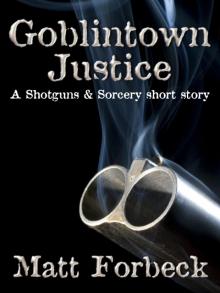 Goblintown Justice
Goblintown Justice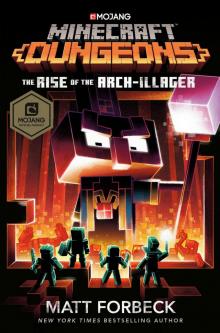 Minecraft Dungeons
Minecraft Dungeons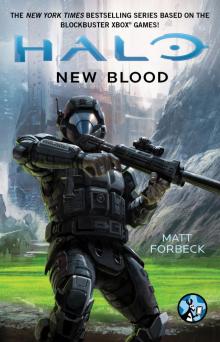 New Blood
New Blood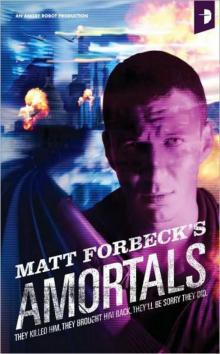 Amortals
Amortals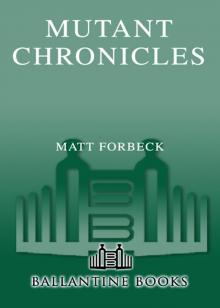 Mutant Chronicles
Mutant Chronicles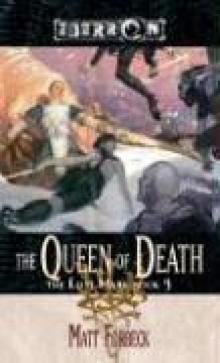 Lost mark 3 The Queen of Death:
Lost mark 3 The Queen of Death: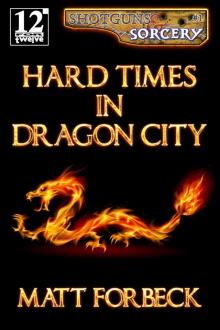 Hard Times in Dragon City
Hard Times in Dragon City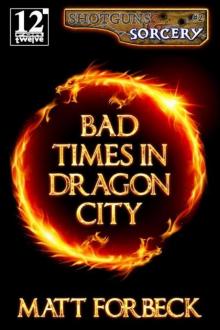 Bad Times in Dragon City
Bad Times in Dragon City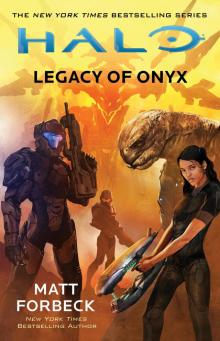 Legacy of Onyx
Legacy of Onyx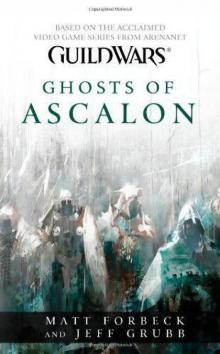 Ghosts of Ascalon (guild wars)
Ghosts of Ascalon (guild wars)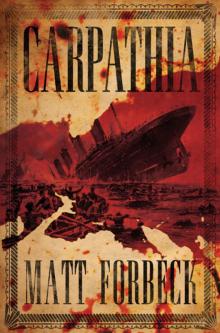 Carpathia
Carpathia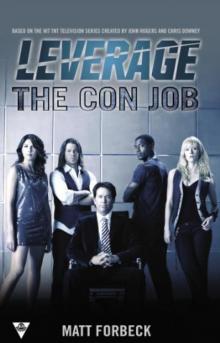 The Con Job
The Con Job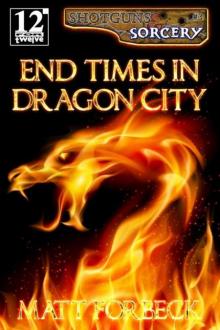 End Times in Dragon City
End Times in Dragon City